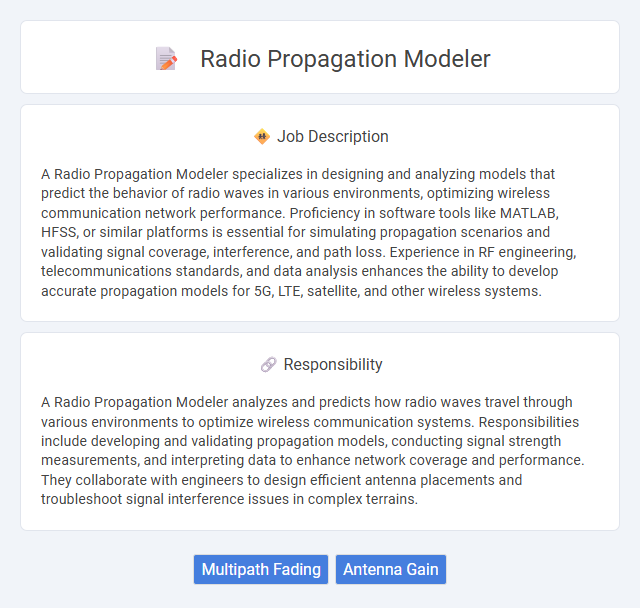
A Radio Propagation Modeler specializes in designing and analyzing models that predict the behavior of radio waves in various environments, optimizing wireless communication network performance. Proficiency in software tools like MATLAB, HFSS, or similar platforms is essential for simulating propagation scenarios and validating signal coverage, interference, and path loss. Experience in RF engineering, telecommunications standards, and data analysis enhances the ability to develop accurate propagation models for 5G, LTE, satellite, and other wireless systems.
People with strong analytical skills and a passion for telecommunications are likely suitable for a Radio Propagation Modeler role. Those who enjoy working with complex data, mathematical modeling, and software tools might find this position aligns well with their abilities. Individuals uncomfortable with detailed technical work or lacking interest in radio frequency technologies may face challenges thriving in this job.
Qualification
A Radio Propagation Modeler requires expertise in electromagnetic theory, RF engineering, and signal processing to accurately predict wireless signal behavior in various environments. Proficiency in software tools such as MATLAB, RF simulation platforms, and Geographic Information Systems (GIS) is essential for developing and validating propagation models. Strong analytical skills, a background in telecommunications or electrical engineering, and experience with 5G and IoT technologies significantly enhance effectiveness in this role.
Responsibility
A Radio Propagation Modeler analyzes and predicts how radio waves travel through various environments to optimize wireless communication systems. Responsibilities include developing and validating propagation models, conducting signal strength measurements, and interpreting data to enhance network coverage and performance. They collaborate with engineers to design efficient antenna placements and troubleshoot signal interference issues in complex terrains.
Benefit
A radio propagation modeler likely improves network performance by accurately predicting signal coverage and interference patterns, which enhances overall communication reliability. This role probably reduces operational costs through optimized resource allocation and efficient network planning. Expertise in propagation modeling may also increase the company's competitive edge by enabling faster deployment of advanced wireless technologies.
Challenge
Working as a radio propagation modeler probably involves navigating complex environmental variables that influence signal behavior, requiring precise calculations and adjustments to ensure reliable communication. The role likely demands a deep understanding of terrain, atmospheric conditions, and frequency characteristics, which can present continual challenges in predicting accurate coverage. Meeting tight deadlines while adapting models for evolving technology trends could also contribute to the profession's difficulty.
Career Advancement
A Radio Propagation Modeler develops advanced algorithms to predict wireless signal behavior, essential for optimizing telecommunications networks. Mastery of propagation models and data analysis tools leads to roles in network design, optimization, and research. Career advancement often includes progression to senior engineering positions, technical lead roles, or specialized consultancy within the wireless communication industry.
Key Terms
Multipath Fading
A Radio Propagation Modeler specializing in multipath fading analyzes how radio waves reflect, diffract, and scatter in complex environments, causing signal variations and degradation. Expertise in modeling techniques such as Ray Tracing, Statistical Fading Models, and Empirical Models helps predict and mitigate the effects of multipath interference on wireless communication systems. Proficiency in tools like MATLAB, Wireless InSite, and network simulators is essential for designing robust wireless networks with optimized signal reliability and coverage.
Antenna Gain
A Radio Propagation Modeler specializes in analyzing signal behavior by incorporating antenna gain to maximize transmission efficiency and coverage accuracy. Utilizing advanced simulation tools, they evaluate how antenna gain impacts signal strength and propagation patterns across various environments, ensuring optimal network performance. Precise calibration of antenna gain parameters is critical for minimizing interference and improving overall wireless communication reliability.
 kuljobs.com
kuljobs.com